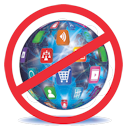When the WWA Overlaps the Physical World

Posted: August 28, 2017
I started a new job at Microsoft a few weeks ago, and, surprisingly, one of the first things they handed me was an Apple MacBook Pro. This isn’t standard procedure, but in my role, I’ll be working with development tools for Android and iOS applications, so a MacBook is required to do (almost) anything with iOS. Anyway, as I setup my Mac, I was having trouble dragging files and apps around. There was something weird going on, but I realized pretty quickly that I had to have a mouse to be productive. I have a mouse here with me in Redmond, but it's a USB mouse and, well, the MacBook no longer exposes regular, everyday USB ports. Sigh.
After work, I quickly headed to the nearest Apple store and purchased a mouse. As I checked out, the sales associate asked me to confirm my email address where they could send the receipt. Right there on his iPhone screen was my new Microsoft address I’d only had for a few hours now. What happened? How did they have my Microsoft email address? I’m certain Microsoft didn’t share it with them, so who did?
Me, I did it. I’d completely forgotten that I setup a new iTunes account using my work email address and my for-work credit card. I did that because Apple won’t allow you to have an iTunes account without providing a credit card number.
The connection here to the World Without Apps (WWA) is a little shaky here, I know, but as this happened, I was immediately struck by how my online life was bleeding into the physical world. It should not have surprised me that Apple could lookup my email address based on the credit card I was using, that’s easy. But in this WWA, how far will this go?
How long before your personal search history starts showing up on store POS (point of sale) terminals? Can you imagine checking out at Macy’s and the clerk saying something like “hey, I noticed you searched for underwear the other day, did you know they were on sale? Here’s a coupon” or how about “Hey, I noticed you saw Jonny Lang last week, did you see his new line of skinny jeans we have for sale?”
This is actually one of the possible side-effects of our government’s removal of restrictions on how ISPs can use your historical browser history. How far will it go? What happens when an agent (a computer program) interacts with the store you’ve entered and they share data? That clearly has strong benefits from a streamlining the shopping experience standpoint, but where could it go wrong? Who decides how much information the store should have access to? You do, but how do you do that in the WWA? Nobody knows.
Next Post: Amazon Alexa is Not Artificial Intelligence
Previous Post: Hacking AI for Fun and Profit
